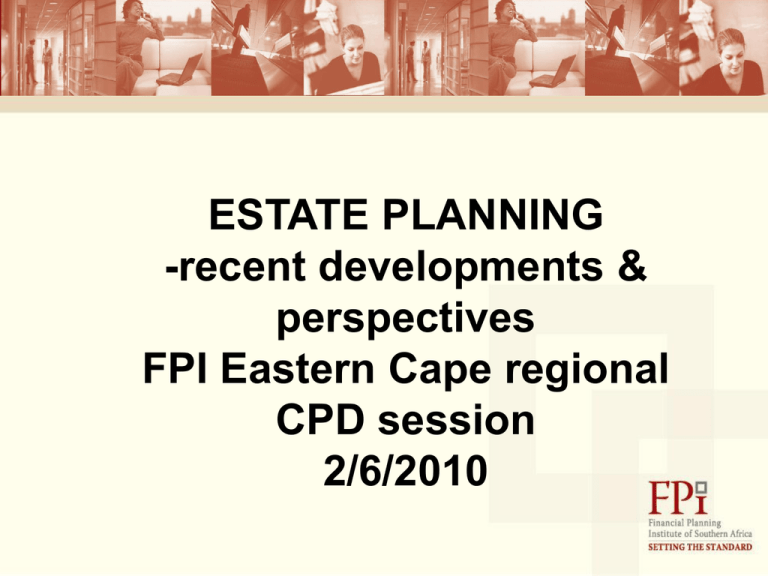
ESTATE PLANNING
-recent developments &
perspectives
FPI Eastern Cape regional
CPD session
2/6/2010
‘Estate Planning can be described as the
accumulation of wealth during your
lifetime, the protection of that wealth
against inflation, creditors, unnecessary
taxes and expenses and finally the onward
distribution of that wealth to the next &
succeeding generations in accordance with
your wishes.’
Tiny Carroll, Glacier by
Sanlam in FA news May 09
There’s no time like the present
Part of the business of financial planning, but
complex……
More than 40 pieces of legislation & countless court cases
However very rewarding to you & your clients
Most cases a proper Will & financial portfolio will suffice
Estate duty is only 0.1% of govt revenue- not just about ED savings
Too often Trusts are set up without any co-ordinated planning &
testators/testatrix’s try to ‘rule from the grave’.
Perspective……
All RSA ‘residents’ are liable to estate duty on worldwide property
Anti- money laundering & tax evasion strategies strengthened: UBS- Switz: 4400 US client names to Inland Revenue & paid $780 mill. in
admission of guilt fines
> 30 ‘tax havens’ negotiating with SARS, NPA & Reserve Bank in particular
targeting Isle of Man, Bermuda, Liberia, Guernsey, Gibraltar, Seychelles &
Mauritius
Under G20 pressure, 40 countries open books to foreign tax inspectors e.g.
Mauritius where SA’s have invested > R 35 bill.
Importance of offshore Will- foreign language; different laws; local
knowledge important. Original Will lodged with local Master- but foreign
jurisdictions also need Will & don’t recognise SA Master’s authority.
Perspective……
Bernard Madoff case:
Mrs. Madoff had > $ 70 mill in assets
Merrill Lynch article: “poor man’s version of an asset protection strategy”
In SA no donations tax between ‘spouses’ widely defined; exclusion of
community of property; therefore protected? (warning- divorce!)
However later reports state that Mrs. Madoff was left with $ 2.5 mill (her
assets were ‘frozen’- USA has a sieze now argue later approach)
NPA- same approach to Tannenbaum’s assets
Same question whether here or abroad- “was the asset intentionally put in a
spouses’ name specifically to avoid creditors?”
Richard Fuld (ex CEO of Lehman Bros) sold $ 13 mill property to wife for
$100, 2 months before Lehman filed for bankruptcy. Assets siezed.
Tannenbaum ‘Ponzi’ scheme- SA authorities acted swiftly
Perspective……
Fidentia fraud case:
Gave rise to PFA amendments: create “beneficiary funds” under control of
FSB, not Master High Court
For death benefits payable to dependents or nominees (major or minor)
enjoys protection akin to pension/ provident funds
As alternative to payment to guardian/s; or to Trustee/s nominated by the
former member or by adult dependent/nominee or guardian (umbrella or inter
vivos or testamentary)
Various choices- imperative you provide appropriate advice
Serves as another warning to clients not to die intestate- you surrender
control into the hands of faceless govt officials at Master’s Office!
Make sure your clients beneficiaries are protected (e.g. check his/her Trust)
PROVISION FOR DEPENDENTS
Figures from Sanlam Trust
No
liquidity
avg. rand
amt
ESTATE
TESTAMENTARY
TRUST
(28%)
280 000
GUARDIANS
TRUST
65 000
GUARDIANS
TRUST(28%)
TESTAMENTARY
TRUST (28%)
WHY NO WILL?
• Sky News: >60% Brit’s die without a Will.
• SA Master’s offices stats (2007): only 40%
of deaths reported had a last will &
testament (60% intestate).
• The same!? But many deaths in SA go
unreported…
For the financial planner as well……
As a ‘door opener’ & more; access to all family members
Many financial planners/ advisers don’t have Wills or any succession plan
FAIS ‘Fit & Proper’- ‘Operational Ability’ includes a “business continuity plan”
‘Financial soundness’ implies certain liquidity minimums
Risk Management Plan “supporting business sustainability”
FSB: 29% of FSP’s visited are sole proprieters & majority haven’t made any
plans for their own retirement or the future of the business
- sole prop’s can’t bequeath their FSP license! No keyperson= no income
- CC’s or Pty (Ltd’s): the business continues but need a keyperson duly
qualified & approved by FSB otherwise no way can operate.
So, train staff; joint venture; ‘buy & sell’; other plans- speak to Compliance O.
ESTATE DUTY ACT amendments
As proposed in 2009 budget speech: Recent changes & proposed changes to Act:
Scrapped sec. 3(3)(a)(bis) w.e.f. 1/1/09 which included lump sums
from pension/provident/ RA & preservation funds
Inserted sec. 3(2)(i) which EXEMPTS them from ED
‘Portable’ unused portion of sec. 4A abatement between ‘spouses’
clarified in Taxation Laws Amendment Act 2009
W.e.f 1/1/2010 irrespective of when former spouse died
Therefore no longer ‘use it or lose it’ approach & couple can have
R 7 mill nett estate & not pay ED.
Threatened attack on ‘one year trusts’? (limited interests) withdrawn said
Keith Engel, Director of Tax, National Treasury.
“Unintended consequences…” yes, see FISA submission
ESTATE DUTY ACT amendments
The total exemption of RA’s (& other retirement funds) adds to the unique
benefits of retirement annuities:
• tax- deductible subject to 15% TNPF limit
• can even wrap a share or CIS portfolio in an RA;
• protected from creditors
• no limit on the amounts invested as far as estate duty exemption goes
• can terminate if emigrating & take proceeds in cash
• no maximum retirement age anymore (was 70)
• lump sums payable to estate even where no nominees/ dependents.
‘Portable’ R 3.5 mill abatement (or ‘unused’ part thereof):
• Polygamous marriage you split R 3.5 mill equally amongst surviving
spouses
• Only the 4A amt that was available to the last spouse to die is
carried over (i.e. R 7 mill maximum)
• Original draft Bill required 1st dying to bequeath entire estate to
spouse (not part of new sec. 4)
ESTATE DUTY ACT amendments
Why is SARS concerned with ‘one- year wonders’?
•
•
•
•
•
•
•
Sec. 5 EDA- a limited interest (eg usufruct) is valued over the life
expectancy of the usufructury (holder of the interest) or the term of
enjoyment of the interest, whichever is lesser
When usufructury/ holder of the interest dies their estate pays ED
Can obtain massive ED savings if Will stipulates that limited interest
doesn’t end at holder’s death but continues for a term (e.g. one year) in
another’s name
Treasury originally proposed deleting reference to the term
Limited interests such as usufructs are used for prudent financial
planning, e.g.
- bequest property to spouse, usufruct to Trust (beneficiaries are kids)
terminates when kids are self-supporting;or
- bequest property to minor kids, usufruct to spouse which ceases after
10 years when kids become majors.
Treasury didn’t throw baby out with the bathwater.
Residential property ‘tax relief’ ….
Taxations Laws Amendment Act, 2009 (new para 51A, 8th schedule ITA):
RESIDENTIAL property is asset of CC, Company (Pty Ltd), or Trust;
On or before 11/02/09 to date of registration of transfer; and
100% of the equity is owned by the resident &/ or their spouse; who
Remain in residence from 11/02/09 until
is transferred to said person/s;
Between 1/1/2010 & 31/12/2011 (to be extended?).
No transfer duty and STC, CGT deferred until new owner disposes of
Don’t have to wind-up or deregister the CC, Company or Trust afterwards
Estate duty neutral as person/s owned the equity in the biz anyway, but..
Enjoy R 1.5 mill exemption for ‘primary residences’ afterwards.
Capital gains tax & loan accounts…saga continues
Bothma Family Trust v C:SARS: bequest of loan account to debtor in 2003
was a taxable gain i.t.o. sec. 12(5) 8th schedule. Not award of cash, but debt.
C:SARS v Brummeria 2007: interest- free loan in return for right of
occupation & development capital = taxable benefit for developer
Bothma case not followed by Lacock J, NCDiv in ‘XXX Trust’; D.Davis J says
Bothma decision was wrong (see The Financial Planner, June/July 2009 ed.)
SARS issued draft interpretation note 10/2008 that interest- free loans only
results in a taxable benefit if recipient gives something in exchange
To avoid any tax, suggest bequeath loan to a 3rd party (eg spouse) or
bequeath a cash amount to debtor so can repay loan (use life policy).
DIVORCE ORDERS, maintenance & pension funds
Sec. 7 (1) Divorce Act- settlement agreement made Order of Court binding on the
estate/ executor
Sec. 7 (2) Divorce Act- maintenance Order ends when payer dies….
Badenhorst case when ‘substance over form’ led to exposure of ‘sham trust’ &
2008 case of Brunette v Brunette & Ano SECLD - joinder of Trustees granted on
basis that parties regarded the trust assets as part of their partnership.
Common misconception when interviewing clients- trust must not be alter ego*
Sec. 7(8)(a)(i) Divorce Act- Court Order against Fund or RA or preserver
Pension Fund Amendment Act 11/2007- the benefit deemed to accrue to member
on date of divorce thereofore non-member can claim their “share”. Tax paid by
non-member if election made on or after 1 March 2009
Benefit accrues at death if not claimed already i.t.o. ‘clean-break approach’
Intestate Succession Act: recognises or should recognise spouses of customary;
religious (Hindu & Muslim- including polygamous) marraiges; same- sex &
heterosexual permanent relationships, subject to legislative enactments
in pipeline (Con Crt) * Article by Prof Geach- same ed. Of Financial Planner
•
*Article by Prof. Geach in same ed. of Financial Planner
Other issues
Trusts & estate plans: if it’s a sale of an asset to Trust & not a donation
have a sale agreement
if it’s a loan not a donation, have a loan agreement
(Do the planning properly)
Non- resident disposes of immovable property (or interest in property
holding company) is liable for CGT, purchaser must withold tax at 5%
proceeds, then seller applies for tax directive
New Companies Act: existing CC’s can convert to company or continue
new sec. 78 allows indemnification by the company i.r.o. directors
liabilities owed to the company & 3rd parties- therefore can purchase
insurance to cover the risk. ‘Contingent liability’ cover for directors/
members crucial to estate plan.
Other topical issues
Foreign investment allowance for SA residents up to R 4 mill.
Death benefits from retirement funds & long-term insurance policies will be
remitted to non- resident beneficiaries (including emigrants).
Exempt life policies, e.g. “buy & sell” sec. 3(3)(a)(iA)- if no premium or part
thereof was paid by or borne by the deceased.
Exemption not apply where shares are owned by a Trust.
The business of financial planning & estate plans
Help clients to give order to their financial affairs
Set goals together
Provide a coherent link between their goals, last wills & testaments, trust
& the results of their plan by scenario illustrations (testing the plan)
Contextualise- external legal & regulatory enviroment compliance
Ongoing evaluation together; liquidity; CGT tests
Build loyal clients- sustainable business; holistic advice
Long- term (risk) insurance & savings- fees; executor’s & trustee fees;
business structuring; reinvestment of estate proceeds.
David Thomson, CFP®
Legal Adviser
Sanlam Broker Services
Chairperson ISG: Estates & Trusts









